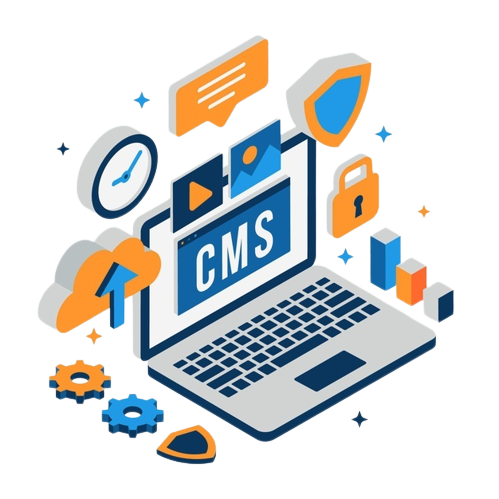Content Management System (CMS) development involves creating, customizing, and maintaining software systems that enable individuals and organizations to manage and publish digital content on websites and other online platforms. CMSs are essential for businesses, blogs, e-commerce websites, news outlets, and any online entity that regularly updates and publishes content. Here’s an overview of CMS development:

Requirements Analysis: Begin by understanding the client’s or organization’s needs and goals for the website or online platform. Determine the type of content to be managed (e.g., text, images, videos), user roles, and any specific features or functionality required.
Choose the Right CMS: Depending on the project requirements, you can opt for an existing open-source CMS (e.g., WordPress, Joomla, Drupal) or develop a custom CMS. The choice often depends on factors such as scalability, flexibility, and the need for specific features.
Custom CMS Development:
Integration: Integrate third-party services and tools as needed, such as e-commerce plugins, payment gateways, social media sharing, and analytics.
Testing: Thoroughly test the CMS for functionality, security, and performance. Conduct usability testing to ensure it’s user-friendly.
Deployment: Deploy the CMS to a web server, making it accessible to users.
Maintenance and Updates: Continuously maintain the CMS by applying security patches, updates, and bug fixes. Regularly backup data and monitor the system’s performance.
User Training: Train content creators and editors on how to use the CMS effectively.
Documentation: Create user and developer documentation for future reference.
Support and Improvement: Provide ongoing support to address issues and make improvements based on user feedback and evolving needs.
Scalability: As your content and user base grow, consider scalability options such as load balancing and cloud hosting.
Performance Optimization: Continuously optimize the CMS for speed and efficiency to provide a better user experience.
CMS development can be a complex process, and the choice between building a custom CMS or using an existing one depends on the specific project requirements, budget, and long-term goals. Custom CMS development offers more flexibility but requires a significant investment in terms of time and resources. Existing CMS platforms, on the other hand, can provide a quicker start but may have limitations in terms of customization.